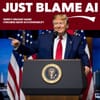US President Donald Trump has hinted that artificial intelligence could become a convenient scapegoat for political controversies, suggesting that future scandals might be dismissed by simply "blaming AI". This approach raises concerns about accountability and truth in politics, with experts warning that it could erode public trust in facts and evidence, potentially creating a post-truth political culture.
Trump's administration has been actively promoting its AI Action Plan, which aims to make the US a leader in the AI race against China. The plan focuses on reducing regulatory barriers, expanding technological exports, and strengthening global alliances. However, critics argue that the plan's emphasis on deregulation could compromise safety and security standards.
The Trump administration's AI strategy has received support from major US tech companies, but experts warn about the challenges of correcting bias in AI models and navigating geopolitical sensitivities. Trump's plan also emphasizes the need to counter China's growing influence in AI development and governance, ensuring that global standards align more closely with US values and innovation priorities.¹
Trump's previous interactions with AI-generated content have raised concerns about his understanding of the technology. He has reposted a fake video that falsely showed former President Barack Obama being arrested in the Oval Office and admitted to being deceived by a machine-generated video montage depicting his entire life from childhood to the present.
The implications of Trump's AI strategy are far-reaching, with potential consequences for accountability, transparency, and the responsible development of AI. As the US government continues to shape its approach to AI, it remains to be seen how Trump's plan will impact the future of AI development and deployment.


